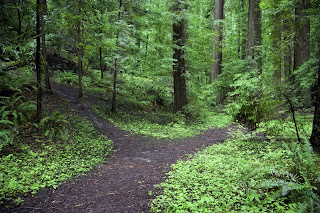Everything is impermanent and nothing may arise without the destruction or decay of something previous. This fundamental concept even holds true to Buddhism and the Buddhas teachings. During the fall of the Han Dynasty in the 3rd Century Buddhist history, or periods, were deduced and categorized into three ages.
The Three Ages of Buddhism, sometimes called The Three Ages of the Dharma are:- Age of the True Dharma
- Age of the Counterfeit Dharma
- Age of the Final Dharma
Age of the True Dharma
This Age began immediately after the Buddhas death and lasted between 500 or 1,000 years depending on the source material used. It was during this age when the teaching were still strong, individuals were capable of comprehending the meaning of the Dharma and thereby skillfully putting it into practice. As a result, many were able to attain enlightenment under their own power.
Age of the Counterfeit Dharma
During this Age the true teachings become obscured and only a semblance of the meaning exists. This Age lasts for 500 or 1,000 years depending on the sources used. However, what is notable during this Age is that only a few people of great intelligence are able to grasp the Dharma skillfully thus achieving enlightenment. Buddhism was well integrated into societies throughout Asia. The decline in individual enlightenment may be in part due to the formalization of the practices, resulting in fewer people achieving enlightenment.
Age of the Final Dharma
This is the current Age in which we are experiencing and by all historical sources will last for 10,000 years. During this Age people are easily tainted by the Three Poisons: greed, anger, and foolishness. As a result, people lose their own aspirations for achieving Buddhahood. We may witness the deteriorating condition of people's feeble capacities, the loss of the meaning of the Buddhas teachings, and the bombardment greed, anger, and trivialities of modern society.
This resulting loss of faith in traditional practices and teachings as means of gaining liberation has led to the popularization of new modes of practice that rely more on an already-enlightened Buddha or a series of texts for liberation.
How do we, as individuals, return to the path the Buddha revealed to us so we may obtain our own Buddhahood?
We may start by remembering the purpose of Buddhism and the Buddhas teachings which simply are the Four Noble Truths and the cessation of suffering. We suffer because we have attachments. From there the Buddha gave us the Noble Eightfold Path which contain precise qualities and instructions on how to achieve liberation.So how do we view or incorporate the many Buddhist scriptures, texts, and venerable leaders transmitting the Dharma today?
If you pick up a dictionary and look up a word you'll get a single definition. If you pick up another dictionary and look up the same word you'll find a slightly different definition. If you pick up a third dictionary and look up the word, again you'll find a slightly different definition. Each dictionary offers the same intention or meaning of the term but is simply presented in a different way.
The same holds true to the tens of thousands of Buddhist sutras, texts, and the many Dharma teachers and leaders. There is not a 'right' or 'wrong' way to transmit the Dharma as long as the Buddhas intent is not lost, the cessation of suffering.
When our words are kind and supporting instead of harsh or vulgar, when our actions are non-violent and unifying, instead of warring and divisive, when our thoughts are nurturing and beneficial instead of destructive and self-glamourizing, we are on our way to our own liberation.
Wishing you continued peace and wellbeing,
Vladimir
You are warmly invited to follow on us on Facebook and Instagram at @bluelotuscenter for more ways to improve your mindfulness practice and wellbeing.
Blue Lotus Meditation and Mindfulness Center is a registered 501(c)(3) religious organization.
Website and monthly newsletter: www.bluelotusmeditation.us
For guided meditations and Dharma talks, please visit and subscribe to our YouTube channel.










.png)